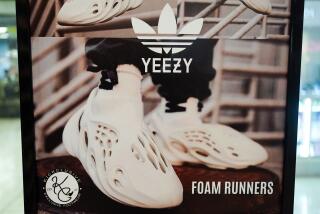Shoe Makers Sizing Up Performance of Celebrity Endorsements
- Share via
There was a time when Shaquille O’Neal could lace up his Reebok International Ltd. sneakers in one commercial and run to the border in another TV spot to grab a bite at Taco Bell.
But the Irvine-based fast-food chain stopped using the Lakers’ star center in commercials earlier this year and he won’t appear in Reebok television ads slated to run early next year.
O’Neal’s agent, Leonard Armato, described a published report that Reebok might be dropping his client as “funny, considering he’s one of the most well-known icons in the world.” And Reebok spokesman Dave Fogelson on Wednesday maintained that O’Neal is a “very important” element in the Boston-based company’s future advertising and marketing.
But O’Neal’s temporary absence from the two high-profile TV campaigns underscores how companies, particularly athletic-shoe makers, that foot the bill for lucrative endorsement contracts are trying to make more effective--and, they hope, cost-effective--use of highly paid pitchmen and women.
“Since the days of Babe Ruth and Joe DiMaggio, people have known that athletes pulled in attention in some fashion,” said Lee Berke, senior vice president of Marquee Group, a New York-based sports marketing firm. “It’s becoming more important to quantify the results of endorsements. Dollars being spent have to be justified in terms of return on investment.”
Select sports stars continue to land huge contracts. Fila Holding signed an $80-million deal in September with NBA star Grant Hill. Nike Inc., which reportedly paid $40 million for its alliance with Tiger Woods, continues to build its relationship with Michael Jordan.
And sports apparel and shoe manufacturers continue the mad dash to splash their logos on athletic team uniforms as they try to build consumer awareness of their brands.
But companies like Reebok, Nike and Converse Inc. constantly review marketing plans--particularly when investors are using their stock prices as punching bags amid fears that dressier shoes are gaining ground and that a glut of product could hurt profits if price discounting occurs.
Boston-based New Balance Athletic Shoe Inc., for example, won’t turn to celebrity endorsements early next year when it introduces its first-ever television commercials.
The commercials instead will focus on “attainable goals and achievements of real people,” said John Donovan, manager of New Balance’s Marketing Services Team. “These ads immediately connect with people on a genuine emotional level.”
Reebok, which is considering cuts in the number and size of its endorsement contracts, next summer will use a fleet of vans that will travel to neighborhood playgrounds where athletes will be invited to try the merchandise on for size.
Reebok broke from the athlete-as-pitchman routine last year with TV ads that featured a real-life research-and-development technician who helped develop some of the company’s new technology. Reebok plans to pair the inventor with athletes in commercials next year.
Fogelson tied O’Neal’s on-air absence for the first half of 1998 to the fact that Reebok products will be pitched on TV by other basketball stars, including Allen Iverson and Shawn Kemp--along with WNBA and ABL stars like Teresa Weatherspoon and Jennifer Azzi. O’Neal will appear in print ads, though.
It’s unlikely, marketing experts said, that endorsements by high-powered athletes will go away.
“We live in a country that’s product-heavy,” said Brandon Steiner, a New York-based sports marketing consultant. “And people are exhausted by the number of choices they have to make. The right athlete can give you an edge by creating sizzle . . . particularly among kids who still put on their feet what they see on TV.”
More to Read
Go beyond the scoreboard
Get the latest on L.A.'s teams in the daily Sports Report newsletter.
You may occasionally receive promotional content from the Los Angeles Times.










